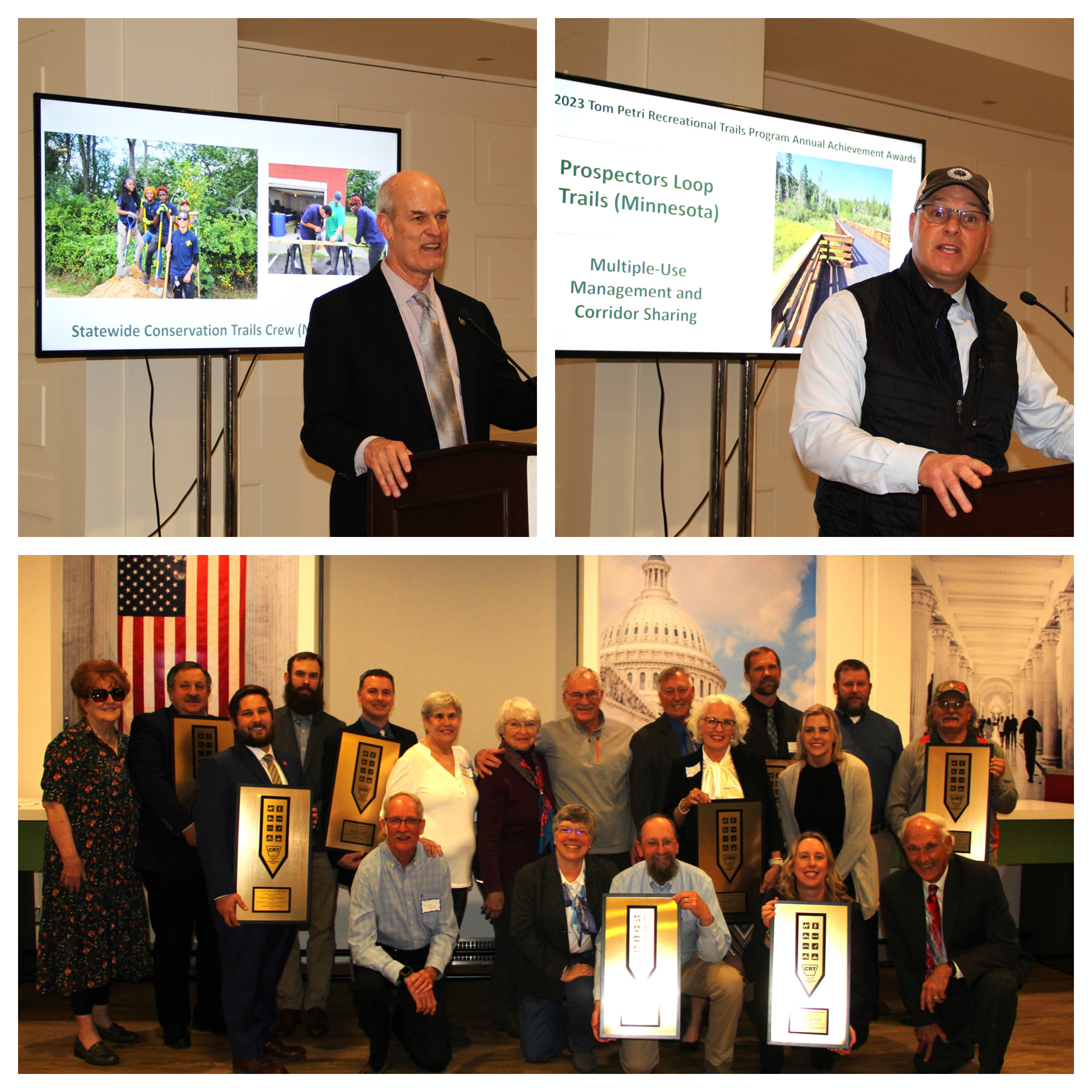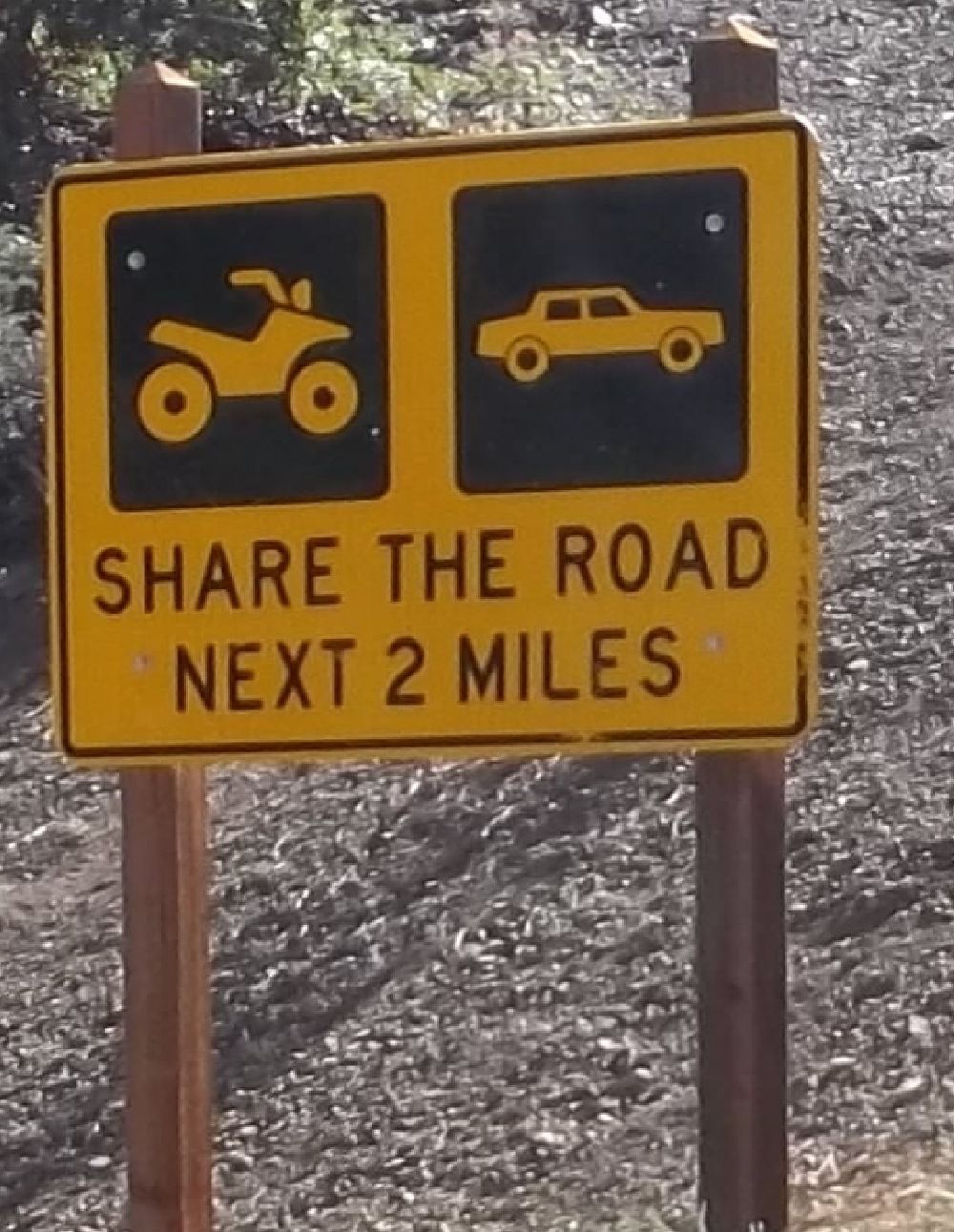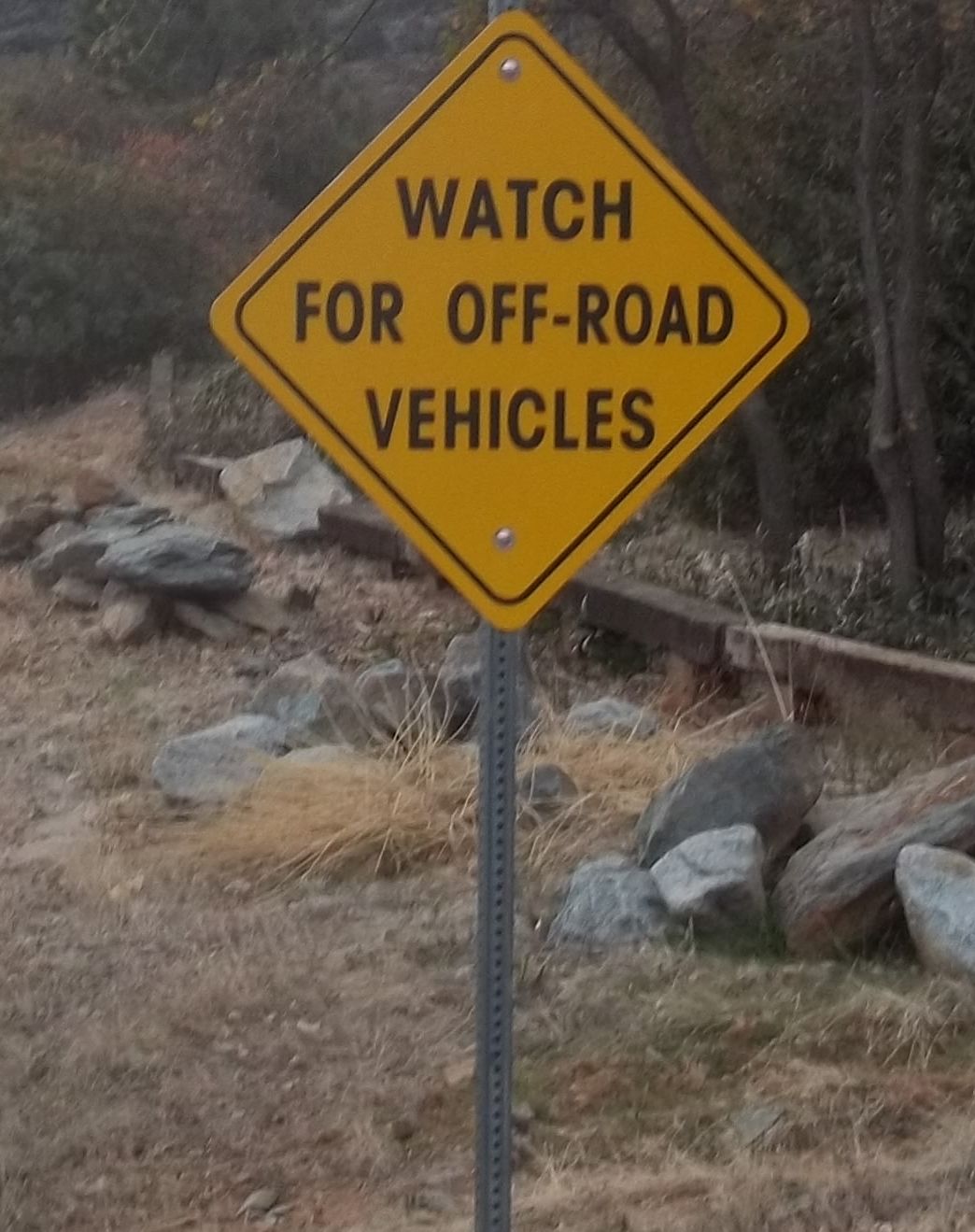
(Photo credit: Coalition for Recreational Trails)
The CRT Award Winners Honored by Members of Congress
On March 6, the Coalition for Recreational Trails (CRT) recognized 12 trail project recipients of its 2023 Tom Petri Annual Achievement Awards. The awards – honoring former U.S. Rep. Tom Petri (Wis.) – recognize outstanding use of Recreational Trails Program (RTP) funds.
The event was well attended and featured several members of the House of Representatives. Reps. Rick Larsen (D-Wash.) and Pete Stauber (R-Minn.) presented awards to project representatives from their districts. Rep. Celeste Maloy (R-Utah), a new Member of Congress and strong advocate for trails and outdoor recreation also stopped by to congratulate the award winners.
“The Tom Petri Annual Awards Ceremony was an outstanding event that brought two dozen trail advocates from across the country to Capitol Hill to tell the stories of their award-winning trail projects,” said Duane Taylor, Awards Committee chairman, CRT. “The recognition not only offered an opportunity for like-minded trail enthusiasts to take stock of their accomplishments, but it also gave them a chance to show members of Congress the vital importance of the Recreational Trails Program.”
For more information about CRT or RTP, visit https://www.americantrails.org/crt.
ARRA Called on CA OHV Enthusiasts to Support the 2024 “SHARE THE TRAIL”


ARRA encouraged OHV enthusiasts in California to support the 2024 “SHARE THE TRAIL” themed spring OHV Safety Week, March 23-31. The educational goal for this event was to help new owners of OHVs better understand the responsibility they have to drive in a safe manner since there is often two-way traffic on public land roads and trails.
The California State Parks’ Off-Highway Motor Vehicle Recreation (OHMVR) Division and partners developed the foundation for this annual State Park Safety Week program after robust discussions on current OHV safety issues at the August 2022 OHV Safety Summit held at the McClellan Training Center in Sacramento.
That conference was attended by various key state and federal agency representatives, powersports industry leads, major OHV organizations, ROV/UTV trainers, motorized media outlets, law enforcement, competition event organizers, and educational non-profits.
The primary focus was improving/updating safety efforts to address the rapid growth of ROV/UTV/SxS use on public lands. That inaugural summit was successful as the group planted the “safety standard” in the ground and resolved to improve safety education to reduce impacts on natural resources and other user groups.
“I am glad to see the California Department of Parks and Recreation and OHMVR Division continue these key OHV safety programs,” said Don Amador, QWR president and ROHVA driver coach. “As a ROHVA driver coach, I have seen the importance of SxS owners enhancing their driving skills and learning about proper safety gear.
“What makes these OHV safety programs so important is that many new operators have very little, if any, driving experience on public land roads and trails. Often, they are not aware that other vehicles could be using the same route, and meeting another vehicle coming around a blind corner could be a safety hazard, which is what makes these outreach programs so important.” Amador concludes.
ARRA believes it is important for the greater OHV community to “share” this important safety and responsible use message with our riding network and those new to the sport.
Trails Benefit Everyone
March is Disability Awareness Month, and American Trails has a mission to advance the development of diverse, high-quality trails and greenways to benefit all people and communities. A disability may be readily visible or invisible. It may be cognitive, developmental, intellectual, mental, physical, sensory, or a combination of multiple factors. Disabilities can be present from birth or acquired during a person’s lifetime. Through collaboration, education, and communication, American Trails raises awareness of the value these trail systems offer.
“Simply put, there is no greater statement of social acceptance than being asked to recreate together as a friend, peer, or colleague,” said Mike Passo, American Trails executive director. “Increasing opportunities for integrated outdoor recreation is so important—it serves as an effective catalyst in changing attitudes.”
The greatest barrier to accessibility on public lands is a lack of information, especially for new trail users. The most effective way to improve access to federal public lands is to provide clear, objective information to the public on what exists. Allocation of resources is another barrier, as access for people with disabilities is often perceived as a secondary consideration to other, more pressing needs. One of the underlying issues here is that many people (not just federal land managers) tend to “pigeonhole” the access issue as simply another special need of yet another minor constituency. For accessibility to receive a higher share of the available resources, resource allocators need to recognize that accessibility is an issue that does or will affect everyone. While it is true that the federal land management agencies have been expected to do more with less in recent years, it is also true that accessibility for persons with disabilities can be advanced in ways that complement and augment other efforts to better serve ALL Americans who recreate on public lands.
Click here to access the American Trails Trail Accessibility Hub, which provides information on planning, building, and maintaining accessible trails. American Trials also offers free webinars from its Advancing Trails Webinar Series.
Legacy Restoration Fund Projects
As part of an ongoing series, we will feature the 37 motorized and non-motorized infrastructure projects totaling $20 million funded through FY23 in the ARRA newsletters. Click here to access projects funded in your state. Below are the projects featured this month:
Motorized and Non-Motorized Trail Reconditioning and Drainage Repair ($300,000)
Bitterroot National Forest, Mont.
This project addresses the deferred trail maintenance backlog across the Bitterroot National Forest. Project work consists of trail work like clearing down trees and rock, brushing back encroaching vegetation, maintaining, replacing, adding drainage structures, repairing or rerouting deteriorating trail tread, etc. This work will improve the quality and safety of the visitor experience by opening lines of sight, leveling trail tread, and replacing hazardous, failing drainage structures.
Oregon Dunes National Recreation Area Recreation Site Road Repairs ($850,000)
Siuslaw National Forest, Ore.
The Oregon Dunes National Recreation Area has Forest Roads 1084 and 1062 that need repair. Flood waters damaged Road 1042 asphalt pavement, and it needs to be repaved. Road 1062 needs realignment of a section of the road that has resulted in safety issues and multiple closures in attempts to fix the road temporarily. Road repair would improve safety and access to high-use campgrounds, shorelines, fishing, off-highway vehicle staging areas, five-dunes/beach access trailheads, Lane County recreational fishing dock, and the Corps of Engineers jetty. Average daily traffic can reach 1,000 vehicles per day during the summer.
Regional Trail Bridge Replacement and Deferred Maintenance (40 Bridges) ($945,000)
Pacific Northwest Region
This project replaces and repairs roughly 40 failing trail bridges across multiple units in the Pacific Northwest. It also strategically addresses the bridges with high levels of visitor use within the Region to maximize the e positive impact on visitor experience and recreation access for both motorized and non-motorized users.
Renovate Corral Canyon & Bobcat Meadow Off-Highway Vehicle Campgrounds ($235,000)
Cleveland National Forest, Calif.
This project will place new picnic tables at each campsite within two campgrounds. This will significantly improve the visitor experience and provide the final amenity necessary to change the status of campgrounds to charge a more appropriate fee for use. The campgrounds serve the Corral Canyon/Bear Valley Off-Highway Vehicle Area, the extremely popular and only off-highway vehicle area in San Diego County.
Sand Trail Deferred Maintenance ($80,000)
Chugach National Forest, Alaska
Sand Trail is the only managed off-highway vehicle route in the Cordova District. The trail meanders 12 miles through scenic Scott Glacier Valley, an important recreational and subsistence use area that contains critical anadromous fish habitat. Work includes reestablishing sight lines, adding aggregate, constructing a turnpike, grading to eliminate washboards and berms, improving fords and minor bridges, replacing signage, and repairing rock barriers.
Recent Bureau of Land Management (BLM) Activity
- Doyle, Calif. – Up to 200 riders were expected to participate in the Diamond Back Hare Scrambles motorcycle race on Saturday and Sunday, March 16 and 17, at the BLM Fort Sage Off-Highway Vehicle Area near Doyle. Trail access was only available to participants while the races were underway. The American Motorcyclist Association and Lassen Motorcycle Club sponsored the race under a special recreation permit from the BLM. The organizers provided course marshals, and the BLM provided law enforcement rangers and staff to help monitor the event.
- Washington, D.C. – The Biden-Harris administration submitted to Congress the President’s Budget for fiscal year 2025, which includes approximately $1.6 billion for the BLM to strengthen and expand the agency’s multiple-use and sustained yield mandate. With those funds, BLM will expand the administration’s commitment to address the climate crisis, accelerate responsible development of renewable energy on public lands, create family-supporting union jobs, and advance environmental justice and partnerships. The goals are furthered by the investments from President Biden’s Bipartisan Infrastructure Law and Inflation Reduction Act.
- Washington, DC – To enhance operational efficiency and address the growing demands on public lands, BLM Director Tracy Stone-Manning announced the establishment of two career deputy director positions at the BLM headquarters in Washington, D.C., by splitting the current deputy director position into two. Michael Nedd, the current deputy director of Operations, will transition to deputy director for Administration and Programs, and Karen Kelleher, the current BLM Idaho state director, will assume the position of deputy director for State Operations.
